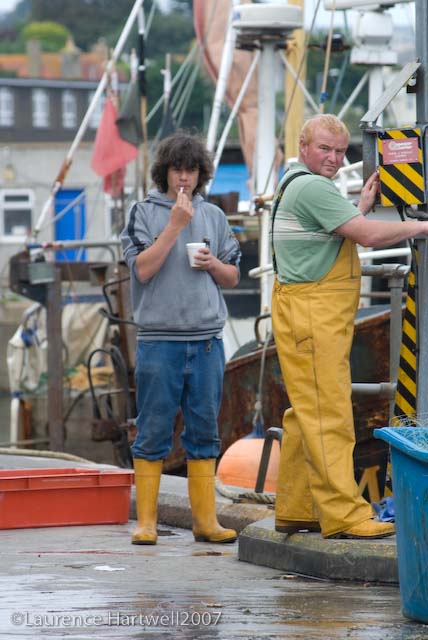New owner of the Tolcarne Inn at Newlyn, Michelin-starred chef Ben Tunnicliffe, says the pub will now re-open on Saturday at 12noon and not today. Call 01736 363074 for more details.
Welcome to Through the Gaps, the UK fishing industry's most comprehensive information and image resource. Newlyn is England's largest fish market and where over 50 species are regularly landed from handline, trawl, net, ring net and pot vessels including #MSC Certified #Hake, #Cornish Sardine, handlined bass, pollack and mackerel. Art work, graphics and digital fishing industry images available from stock or on commission.
Wednesday 1 August 2012
Fancy a pint in the first Olympic town of Newlyn? - Saturday opening for the Tolcarne Inn
New owner of the Tolcarne Inn at Newlyn, Michelin-starred chef Ben Tunnicliffe, says the pub will now re-open on Saturday at 12noon and not today. Call 01736 363074 for more details.
Golden girls -Team GB's first and it's Cornish Gold!

On your marks.......
after 500m, easy does it girls!.......
half way and already clear water from the rest of the field.......
the girls are looking good.......
three quarters of the way there and well clear......
Glover's Gold - team GB over the line first!!!!
well done girls!
GOLD!!
Helen Glover - going for gold!
After the fish auction is over around 7.30am, all hands retired to the Mission for breakfast and a chance to catch up on the Olympic news with a keen interest in the sailing.......
 |
| There's liquid gold in Newlyn |
the 'world famous Jelbert's' ice cream as the BBC called it the other morning is enjoyed by all!
Wednesday morning.
The sun is just about breaking through heavy cloud cover this morning......
as Cap'n Nudd tales the crabber ~Intiuition out for a day on the pots.....
one of Newlyn's many merry mackerel men........
a stonking turbot sold to the highest dder......
and a fair few boxes of mackerel around........
the green team crew moving at speed this morning......
walking the Harvest Reaper back to her landing berth......
one quay lampost trying to emulate the angle of the Blue Angel's derricks.......
with a 1200hp ABC main engine burning 3,500 litres of fuel a day this swallow rig must be catching a serious amount of fish.......
monks making money this morning.......
then the rains came.......
and cleared the decks save for a solitary gull.......
out through the gaps minus her derricks, the beamer Louisa N is bound for Polruan and the Toms shipyard.
Monday 30 July 2012
Cracking crab thermidor courtesy of Kevin
There are numerous variations on the classic shellfish sauce recipe - Lobster Thermidor being the most well known, crab makes a cracking substitute and is preferred by many.....
Making up the thermidor sauce....with no sherry in the house, Chinese Xhaosing wine makes an excellent substitute - a store cupboard must......take some freshly picked crab - minus the claws that found their way into the Mexican chilli cocktail......
clean, then heat the shells in the oven and spoon about one third of the sauce........
before adding the crab covered sauce complete with a dustin of parmesan cheese.......
and slip under the grill - very rich and an ideal summer starter - best served with sautéd potatoes and some crunchy green veg like mange tout......
head on over to M&R Crab at Stable Hobba or give the guys a ring on 01736 351485.
Monday's fresh fish course
Keeping an eye on things.......
good to see the St Georges finally made it out through the gaps, if only for a shakedown......
fire up the BBQ!........
plenty of ray on the market from the inshore boats this morning......
cracking crod.......
'andsome 'ake.......
delicious dory.......
Jeremy bound away for another day.......
just checking those Cornish sardines.......
the gear aboard the huge Belgian beamer, Blue Angel.......
on her clear deck.......
the boat's stern showing her to be aground.......
and bow, where she draws nearly 4m!.........
things are looking spruce at the Tolcarne ahead of opening day.
good to see the St Georges finally made it out through the gaps, if only for a shakedown......
fire up the BBQ!........
plenty of ray on the market from the inshore boats this morning......
cracking crod.......
'andsome 'ake.......
delicious dory.......
Jeremy bound away for another day.......
just checking those Cornish sardines.......
the gear aboard the huge Belgian beamer, Blue Angel.......
on her clear deck.......
the boat's stern showing her to be aground.......
and bow, where she draws nearly 4m!.........
things are looking spruce at the Tolcarne ahead of opening day.
We’re all crazy for Cornish sardines!
 |
| Freshly landed Cornish sardines are held in iced water |
Here's an article that appeared in the Telegraph today: We are staring through the gloaming into a cold sea. “Look, there, can you see it?” says Stefan Glinski. His oilskins gleam yellow under the bright sodium lights that make the fishing boat look like a night-time film set. He points to a flash of silver in the water. “In a minute we’ll be able to see what we’ve got.” What we’ve got turns out, as the circular net pulls tighter and the splashy flick-flack of their tails grows louder, to be herring. About five tonnes of them. Dash. We were really after sardines.
 |
| Make sure the charcoal bed is really hot and the flames have gone before cooking your sardines |
Sales of fresh sardines at Tesco have rocketed by180 per cent in the past year. “We think they’ve become more popular because people go on holiday to the Mediterranean, eat them there in the sun, then have them at home too,” says Tesco’s Mike Baess. It’s probably also because they are relatively cheap, a good source of omega-3 and can be sustainably fished (a rather hotter topic than I imagined, and one I’ll come back to in a minute). But in particular, despite the Mediterranean influence, we are eating even more Cornish sardines. In 2010, 1,080 tonnes of this ocean fish were landed in Cornwall and sales last year rose by 51 per cent — quite an achievement considering that as the 20th century drew to a close sardine fishing in Cornwall had almost died out.Even 54-year-old Glinski has been catching them for only nine years, and he is a stalwart of the local waters who has been fishing since he was 16.
Sardines, or pilchards, as they used to be known — the Latin name is sardina pilchardus — have an important place in Cornish history. Salted, pressed and packed into wooden barrels and boxes, for centuries they were a delicacy that was was shipped all over Europe. Then the fish slowly fell out of fashion as domestic refrigeration caught on. “In 1995 only seven tonnes of sardines were caught off the Cornish coast,” says Nick Howell of The Pilchard Works fish suppliers in Newlyn. “The market was dying fast as the little shops that sold them closed down. I realised I needed to do something about it.”
He had the clever idea of changing the name from pilchards, with its overtones of ration food, to Cornish sardines. He also persuaded a supermarket buyer who called to ask if he could get hold of some French sardines that what the store actually wanted was pilchards from Cornwall — and, later, along with others, lobbied for Cornish sardines to be given their own PDO (Protected Designation of Origin), an EU status that they successfully obtained a couple of years ago. There was just one problem: back in the Nineties hardly anyone was actually catching sardines.
“We were buying from the Scottish boats coming in to do the mackerel in the winter,” says Howell. “It was a by-catch for them. Then I was chatting to Nutty Noah about it one day…” Nutty who? “Nutty Noah. We all call him that. He’s about 6ft 4in and has a big beard under his chin like an Amish. His real name’s Martin Ellis. Anyway, he bought an old ring net from a chap in Mousehole and started fiddling about with it, catching sardines. He tends to have these wild ideas. “We’re a small community down here and he’s from across the bay, a Cadgwith man, so for a year and a half they all just watched him and didn’t want to copy him. He actually sank the bloody boat in the end, had to have the helicopter out. Anyway, that’s when Stefan started. And others soon followed him.”
Glinski also fishes with a ring net. He shows me how it works as we sit in the fishy-smelling cabin of his boat, White Heather, while the three members of his crew work outside. “We can shoot the net at any moment, as long as we’re not near rocks that might tear it. These things cost £25,000.” He uses sonar to spot shoals of fish beneath the surface, then wheels the boat in a circle, dropping the net — 250m long and 60m deep — around them. Then the purse rope, which pulls the net closed at the bottom, can be tightened and the catch drawn in. The reason we are out at night is simple: if it’s light and the fish can see the net, they are more likely to swim off, sharpish, before it closes. “The fish are here almost all year round,” says Glinski. “There’s just a short gap of a couple of months in the spring when we don’t have them. The highest fat content is in July, August, September and that’s when they taste the best. Then it starts to drop off in December so by March they’re skinnier and a bit out of condition and don’t taste as good.” There are also lots of them — hundreds of thousands of tonnes.
This is good news for those concerned about sustainable fishing, bad news for anyone unfortunate enough to get Glinski started on the subject of certification. “Yes, we are certified,” he says with a baleful look at the Marine Stewardship Council (MSC) representative standing in the corner of what suddenly feels like a very small and slightly precarious cabin. “There are four boats and two processors in our fishery and we’re certified by the MSC but we’re thinking of pulling out. When we signed up they said it would cost £1,000 a year and £3,000 for a re-audit. Costs now are actually running at £5,500 a year and they’re now quoting £18,000 for re-certification in three years’ time. And we don’t see any benefit to it. I don’t think customers even know what the MSC sticker means. And half the time the supermarkets don’t put it on anyway.”
Happily for the nervous-looking MSC man, Glinski is distracted at this point by some noisy seagulls which suggest that there may be fish near by. A few minutes later he is giving the order to shoot the net. And shortly after that we are all distracted by the mesmerisingly beautiful sight of several tonnes of fish thrashing and flashing, the light catching their silver scales as they pour in a glorious stream from the net into the boat. Good enough to eat? More and more of us certainly think so.
 |
| The Cornish sardine boats often work within sight of their home port of Newlyn in Mount's Bay |
Article courtesy of Daily Telegraph Food and Drink.
And from another article in the same paper, here's a good reason to be a fisherman:
Farmers, forestry workers and fishermen happier than the rest of us, ONS study to find
Subscribe to:
Posts (Atom)












































